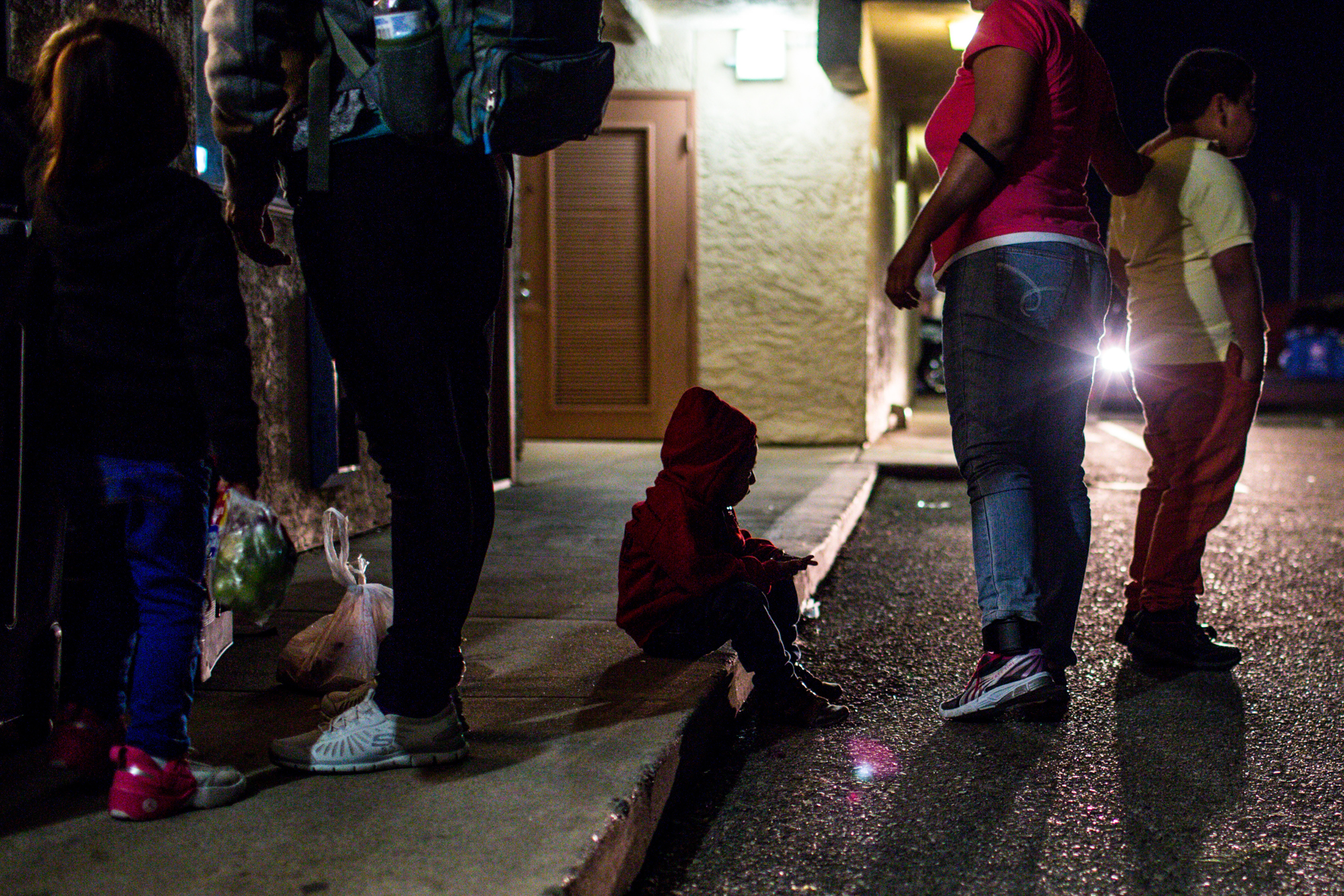
Footsteps into America: A migrant’s journey of struggle, hope and the unknown
By Story by Chris McCrory, Visuals by Nicole Neri/ Cronkite News |
TUCSON – The motel is plain vanilla. Motorists streak past it on Interstate 10 without notice or memory. But inside the gates of the complex, over several days in October, 112 migrants, many from Guatemala, turned the motel into a temporary neighborhood.
Children chased their friends underneath the stairs. Parents leaned against walls and chatted with neighbors on a common path of pursuing asylum in the United States. The low hum of Spanish wafted through the rooms and grounds of the motel, mixed with English and peppered with phrases in indigenous languages, such as K’iche’ and Mam.
Inside, a first-floor office was packed with volunteers. On the walls, whiteboards and sticky notes that form a tracking system to help provide the migrants with food and shelter.
Upstairs, Elias sat on a polyester bedspread. He spoke of fear and relief.
Of bringing his child thousands of miles from home.
Of eluding police and gangs traveling through Mexico.
Of immigration authorities dropping him and his son and dozens of other migrants at the motel.
The migrants, who were fleeing poverty and crime in Central America, were allowed conditional entry into the U.S. after crossing the southern border and requesting asylum. Immigration and Customs Enforcement agents, with a spokesperson later saying there were too many migrants to handle, brought them to volunteers in Tucson who put them up at the motel on I-10.
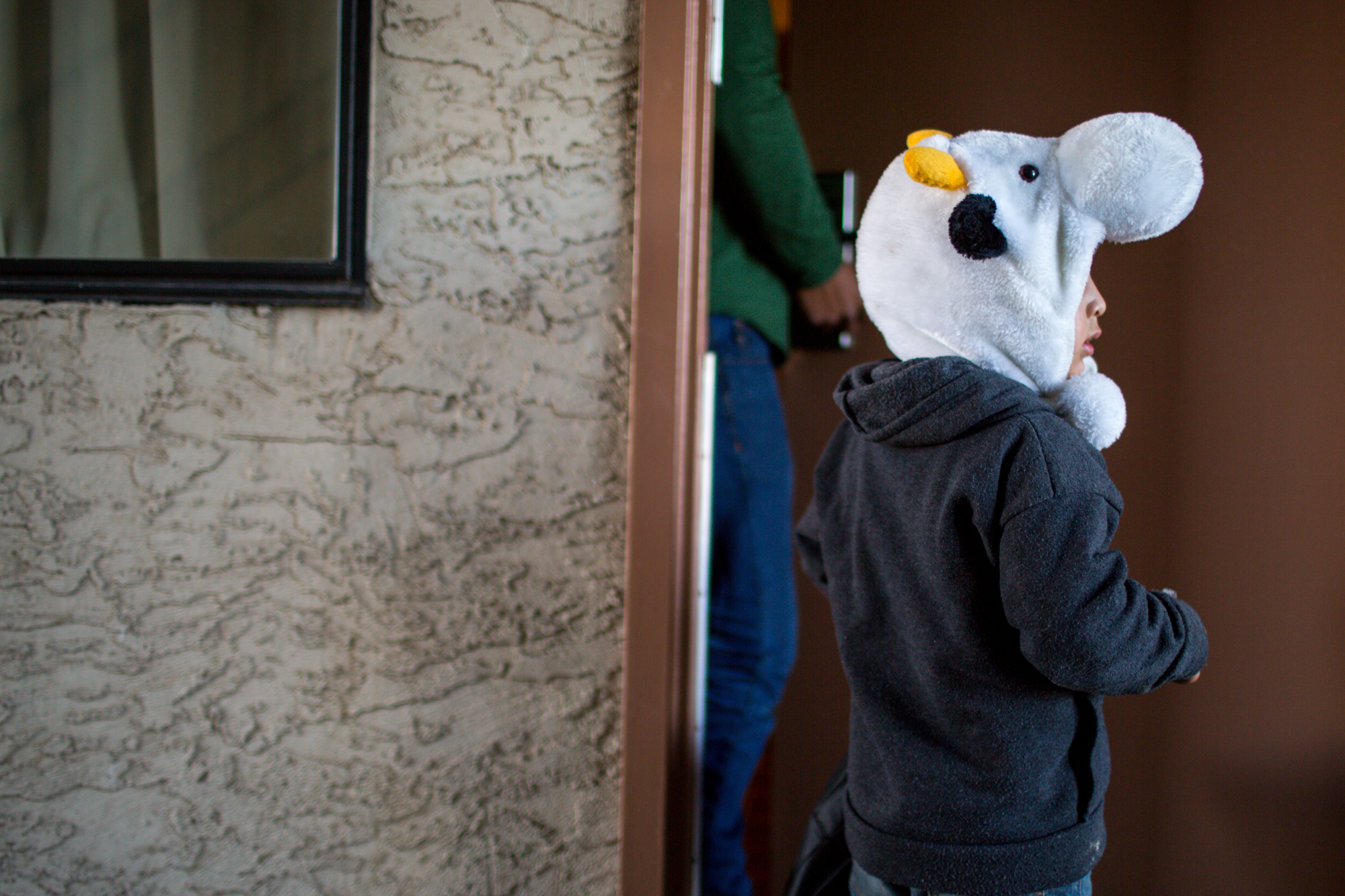
The migrants who traveled from Central America turned the motel into a temporary neighborhood where children chased one another under stairwells.
Within a few days, the migrants scattered throughout the country.
But their stop in Tucson lingered in the continuing debate over immigration, both legal and illegal, in the U.S. and the rest of the world, among politicians, advocates and people across the ideological spectrum.
The migrants’ journey turned on the decisions of outside forces: Whether ICE would detain them or release them sooner to their destinations. Whether supporters would house and feed them or the migrants would be left to fend for themselves on the streets of Tucson. And, finally whether federal officials will ultimately allow them to stay in the U.S. or return them to the countries they fled.
The 112 Central Americans were among thousands seeking asylum in the U.S. According to TRAC Immigration, a nonpartisan immigration research program, from 2011 to 2016, 8,540 migrants applied for asylum to the federal government. Few, however, succeeded.
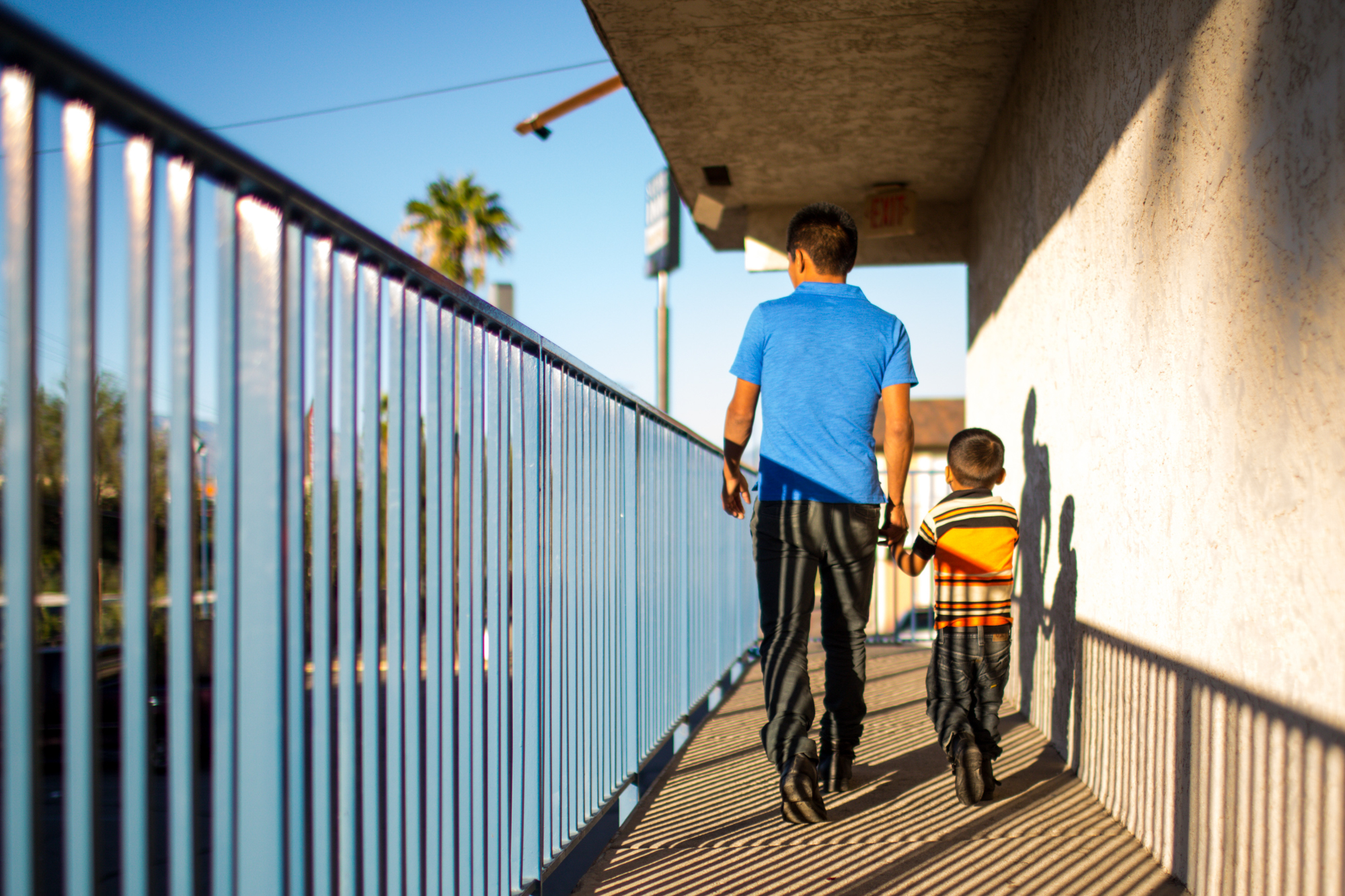
For some of migrants who were lodged at the Tucson motel, it was the first chance to connect with loved ones left behind in Central America.
Gasp of air
For the migrants, most of whom are from Guatemala, the motel was the first place in the United States that felt welcoming. They could take a breath.
In his second-floor room, Elias, who provided only his last name because he feared it would affect his family’s chances of staying in the U.S., pulled up a pant leg to show his ankle bracelet. ICE attaches GPS trackers to asylum seekers released into the U.S. while awaiting immigration court hearings.
He shared the room with his elementary-school aged son, who listened, along with his new friends, as his father told their story. Elias spoke haltingly in Spanish, pausing between words.
They had to leave Guatemala because of the poverty, he said, adding that he and his son soon packed into a truck with others.
“From the first day, we felt fear,” he said. “When we left in the truck, it was overloaded, one on top of the other. It was very dangerous. Then we got to Veracruz and got into another bus. You’re scared that at any moment, police are going to stop you, and you are hungry, thirsty.
“Sometimes you are starving because you don’t know how much things cost. We’re not familiar with the currency in Mexico, how much things are worth. And then you end up spending what little money you have.
“No one gives you anything to eat. No one.”
They were told to avoid the authorities in Mexico and make sure gangs don’t find them. In either case, the migrants would have been beaten and humiliated.
“Sometimes when you’re in your own country, people tell you it’s easy (crossing), but in reality it’s very difficult,” Elias said.
The father and son made it to a U.S. port of entry, where they asked for asylum. Elias was nervous because he knew about the Trump administration’s family separation policy.
“I was afraid. He’s underage,” Elias said of his son. “I was scared they would take him away from me if I was deported. He would stay, and I couldn’t get him back.”
ICE held Elias and his boy for several days before transferring them into the care of Casa Alitas. The volunteer group is run by Catholic Community Services to help asylum seekers with transitional housing, food and clothing before they were sent to stay with family and friends while awaiting word from the government.
They were part of a surge of migrants ICE dropped on the volunteers, who usually place migrants in churches but turned to a motel because of the unexpected number of people they needed to serve, said Diego Lopez, a site coordinator with Casa Alitas.
ICE dropped off about 24 migrants each day for four days, about the same number were rotated out, Lopez said.
Volunteers had to scramble. Feeding, clothing and housing that many people at one time was a complex operation.
At the motel’s makeshift command center, people darted in and out of the doorway while several volunteers sat at cabinets, tables and a desk in the middle of the room, typing information into a computer spreadsheet – family names, room numbers, bus routes.
In a room around the corner, doctors from the University of Arizona sorted boxes and crates full of medical supplies. They volunteered to help, treating headaches, cuts and one minor case of trench foot.
Food, donated by local restaurants, filled another room. Dinner was served at dusk.
“You have to think about what would drive you to leave your home, even here, to flee to a country where you don’t even speak the language,” volunteer Juanita Trejo said as she left for the day. “You have no idea what to expect, you just have this image of hope and a better life for yourself and your children.”
For some of the migrants, staying at the motel was the first chance they had to connect with loved ones back home. Raymundo, who declined to give his last name because he fears retribution, said it was a relief to speak to his family in Guatemala.
“Here, we’ve been able to call our families and we are happy to know they are OK,” Raymundo said. “It was a huge relief when I was able to tell them, ‘Family, I made it,’ to my wife and children because we lost communication when we entered Mexico.
“Now that we are here, it was a huge relief for our families to know that we are well, healthy and we are willing to work.”
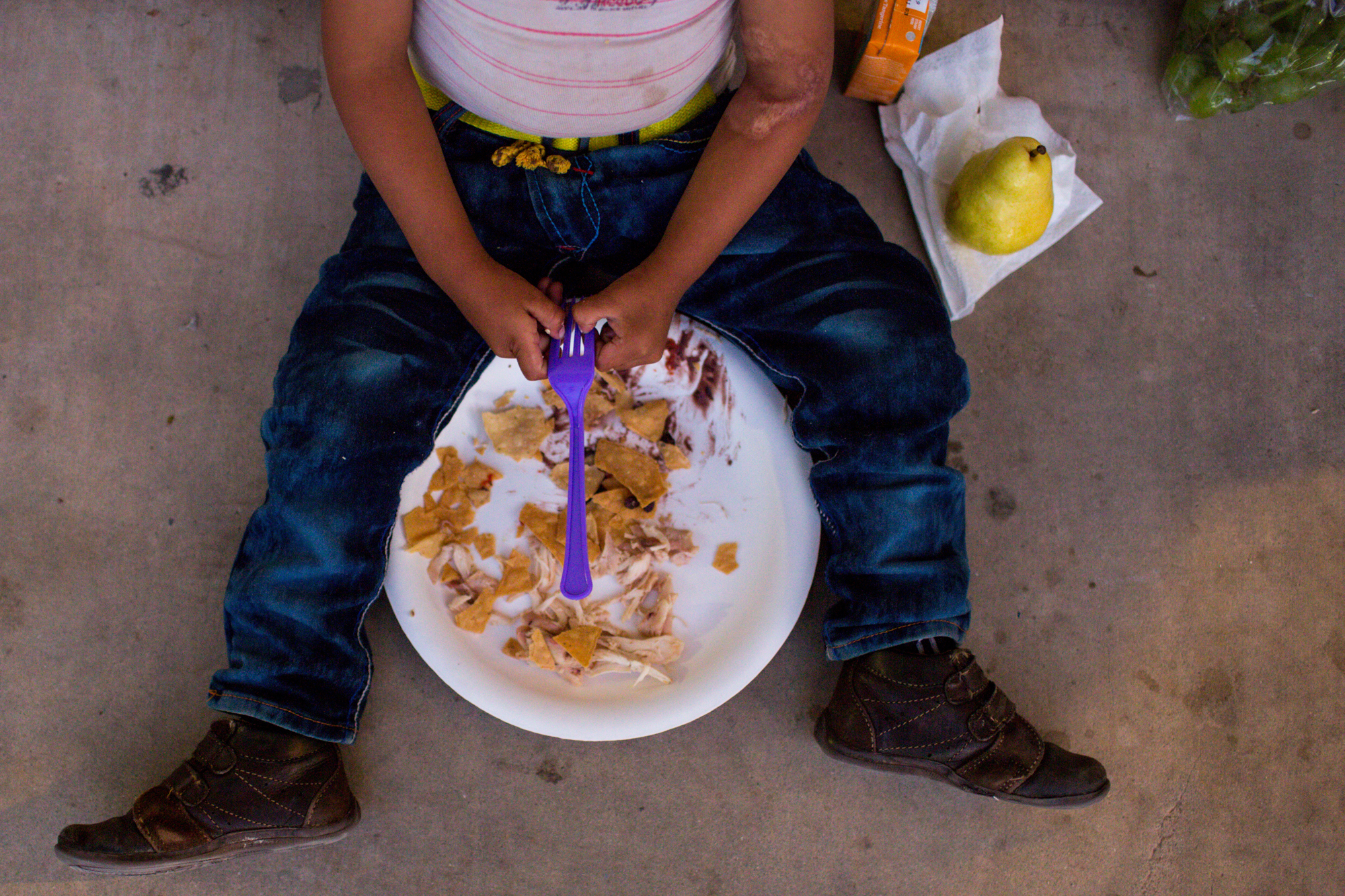
A young boy from Central America plays with his fork after finishing dinner, served by volunteers at the Tucson motel where 112 migrants were temporarily housed. For many of the migrants, this was their first chance to rest since making the arduous journey through Mexico to reach the U.S.
Stumbling blocks
The respite at the hotel would be brief. The new immigrants grappled with language and, perhaps unknown to them, were caught up in a national debate over politics and policy.
In recent developments, President Donald Trump signaled that he may close ports of entry, essentially halting the asylum program for people coming from Central America.
Most of the 112 migrants who stayed in the Tucson motel left ICE detention facilities on Oct. 15. Many are parents with young children. Almost none spoke English, requiring volunteers to help translate. Some don’t speak Spanish and asked their children to help them communicate with volunteers.
“We have to sometimes depend on the families to translate from Spanish to another language because they speak Mam or K’iche’ or another language that we don’t have knowledge of or support speaking here,” Lopez said.
And there was always the fear that a family will a miss a bus or have a long layover in a city in the U.S., stuck in a city they know nothing about with no money, no food or clue how to reach their end destination. In those cases, volunteers instructed them how to contact Casa Alitas, he said.
The migrants also have to contend with the larger battle over immigration in the U.S.
For years, ICE would call Catholic Community Services and let them know they were releasing asylum seekers, Tucson City Councilman Steve Kozachik said. Volunteers would be ready for when ICE dropped small groups off at a midtown home owned by the church organization. Without its help, the migrants would be on their own in a strange land.
In September, the calls stopped. The group didn’t receive any asylum seekers for days. Then, Kozachik said, it felt like the floodgates opened.
“Here within the last few weeks, it was, ‘We’re going to have 50 people for you in an hour’ or ‘We’ve got 45 people for you. We’re driving up to your front door in 25 minutes,'” the councilman said.
“The ability of the nonprofits, of the churches, of the volunteers to really handle this and be light on their feet and say ‘OK, we’ve got the food, got the clothing, we’ve got the capacity to handle,’ that just disintegrated overnight.”
Kozachik, a Democrat, believes the recent influx of migrants ICE has released in several Arizona cities, including Tucson, Yuma and Phoenix, is politically motivated. He said ICE is holding onto migrants for much longer than usual, breaking a 15-year-old U.S. policy to drive home the Trump administration’s get-tough immigration stance in advance of the Nov. 6 midterm elections.
“It’s a great narrative, right at the beginning of an election cycle to say, ‘We are being overrun at the border by these illegals, and we have to elect strong border candidates,'” Kozachik said. “I think it’s disgraceful that we would be making political pawns out of people who are fleeing for their lives, literally.”
He mentioned U.S. Senate candidate Martha McSally as a politician who would benefit from optics. She attacked the asylum process in May, calling it “broken” and “rife with fraudulent claims.”
“Aliens can simply come to a port of entry or look for a Border Patrol agent and simply say they have a ‘credible fear,'” she said at a House subcommittee on Homeland Security. “Saying these simple words permits aliens to be released into the country around 90 percent of the time regardless of the merit of such claims.”
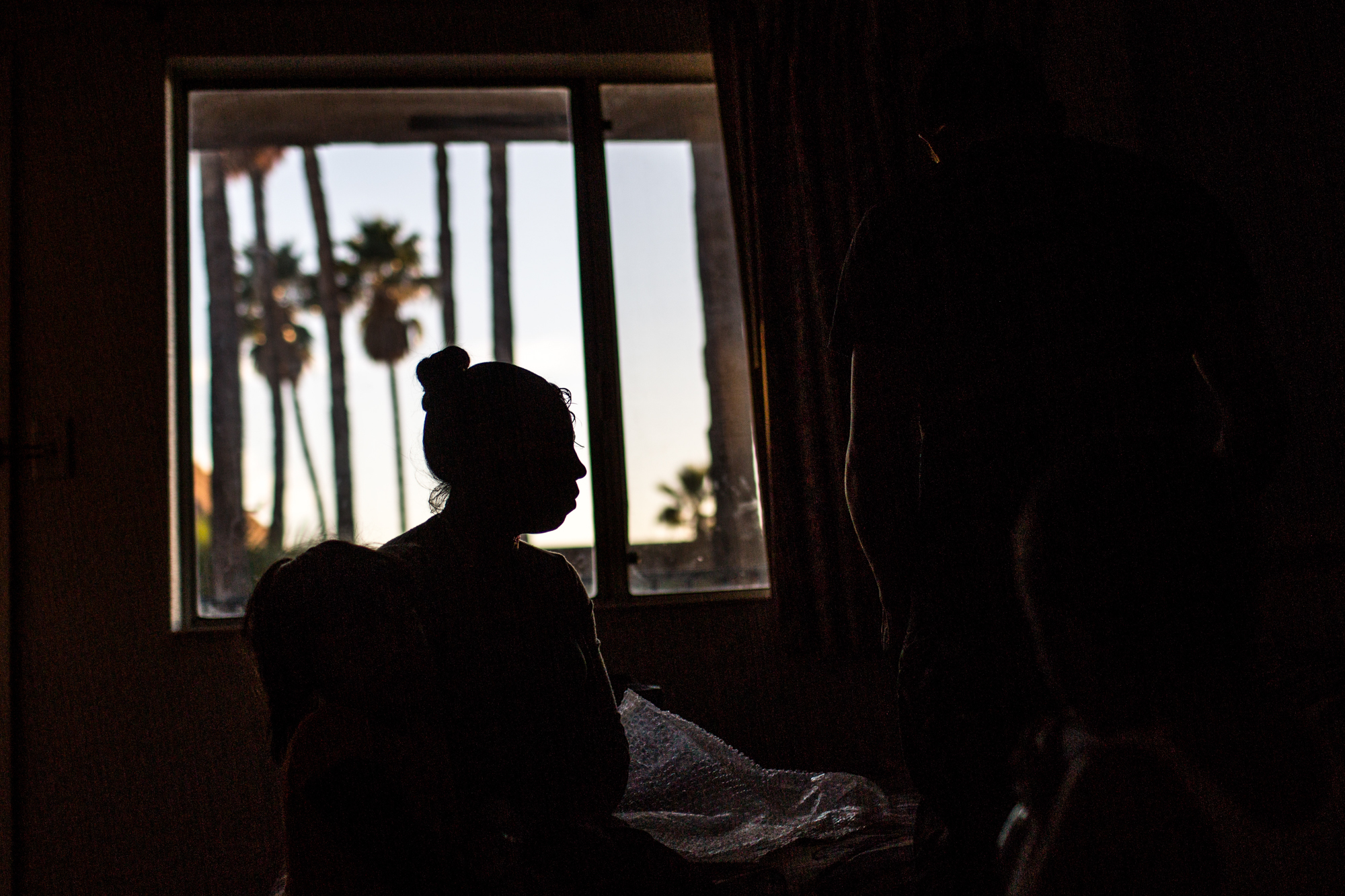
A young mother and her family unpack in their room at a Tucson motel. Leaders of a program to help migrants seeking asylum said placing them in a motel instead of homes or churches was a last resort because it's expensive. But the program didn't have room in its usual locations, so it was forced to pay for motel rooms.
Other Arizona politicians have taken similar hardline stances against those seeking asylum. Rep. Paul Gosar, R-Prescott, said in a May interview on SiriusXM’s Breitbart News Tonight that lawyers helping migrants – including asylum seekers – were criminals.
“We actually have a law – you may not like the law, it is a law until you change it – and that is aiding and abetting an illegal alien,” he said “What we need to do is also hold those that are actually helping – what they’re saying is help, but assisting in a crime – to be prosecuted as well.”
ICE officials, in an email, declined to directly answer Kozachik’s accusations that the agency changed policy based on the upcoming elections.
But spokeswoman Yasmeen Pitts O’Keefe said, despite some of the Guatemalan migrants’ claims they were in ICE custody as long as eight days, immigration authorities did not flout the Flores Settlement Agreement. That agreement, established in a 1997 Supreme Court case, limits the amount of time undocumented immigrant children can be held by ICE or Border Patrol agents.
ICE denied holding family units longer than the 72-hour maximum detention period. Instead, the agency has been cutting back in other areas to meet the legal deadline.
Pitts O’Keefe said ICE used to conduct reviews of migrant families before they were released, including evaluating whether the family had the financial means to reach a final destination within the U.S.
As of Oct. 7, ICE stopped reviewing the asylum seekers because of what they describe as a “recent uptick in (family units) presenting themselves along the Arizona border,” Pitts O’Keefe said in the email.
Into the unknown
Elias and his son, along with 110 other Central Americans, will travel on Greyhound buses to places as far away as New Jersey and Florida, where family or friends already live.
Early last week, organizers shut down the motel community, moving families to churches in Tucson while they wait for their buses. Motels are the last option for housing the migrants because of the expense of renting the rooms and challenges with security.
“All of the families have either begun their travel to their final destination or are staying at a different location until bus transportation can be arranged,” said Marguerite Harmon, CEO of Catholic Community Services of Southern Arizona. “We will no longer be housing people at this motel.”
But community activists feared the closing of the motel was not the end of the migrants’ struggle. And resources are thin.
“We do not know how many more people may be arriving in the coming weeks, and if the places we have at (Catholic Community Services) owned houses and with our church and faith community partners will be adequate to assist all of them,” Harmon said. “We will continue to do this work as long as we have the resources to do so.”
Kozachik said the group might not be able to afford motel rooms again.
“That’s not sustainable financially,” he said. “We can’t keep doing that. That’s expensive as hell.”
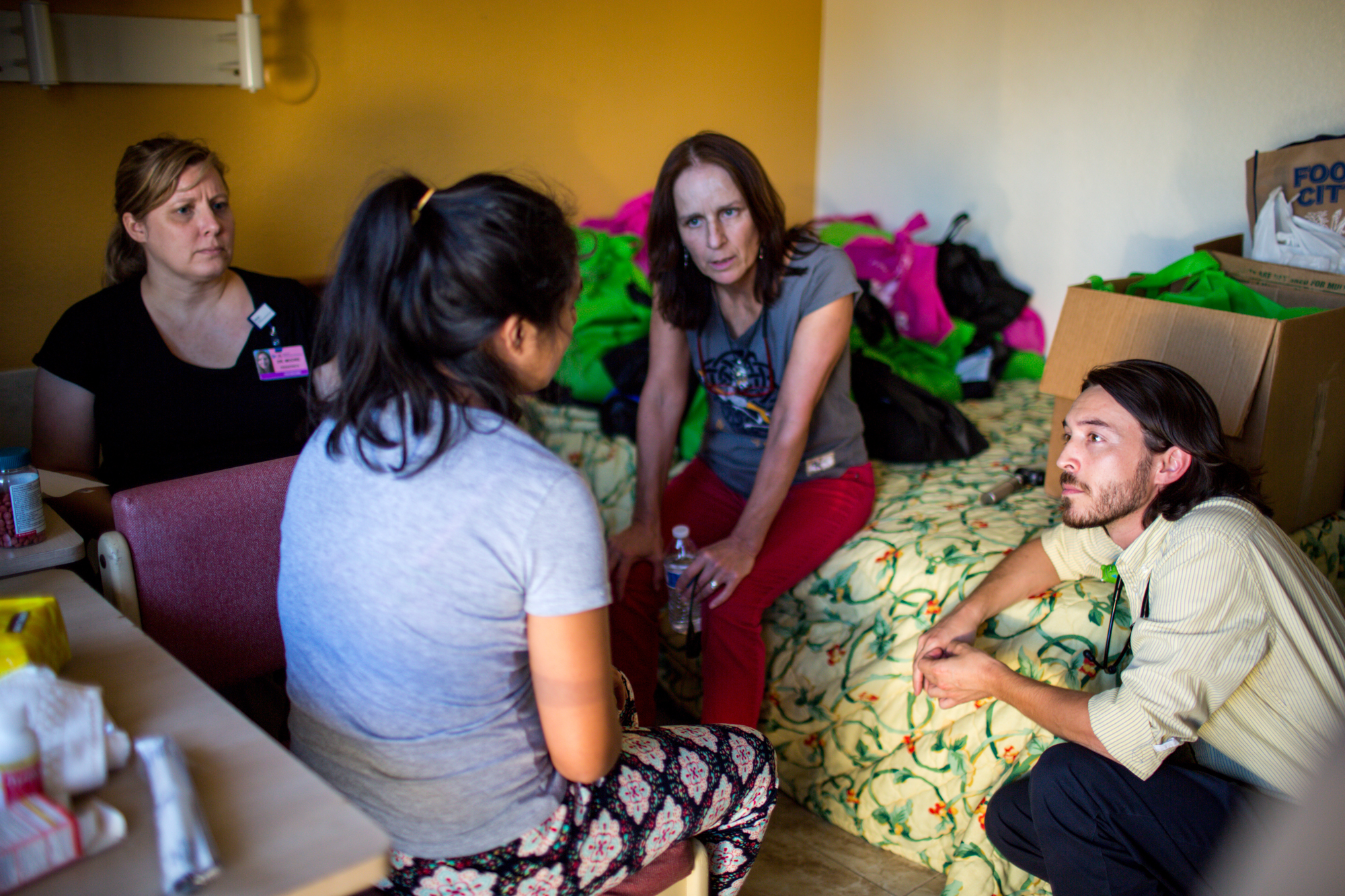
Theresa Sires, a Catholic Community Services volunteer (in red pants), translates as medics Melissa Moon and Anthony Facaloro prepare to treat a young woman's leg injury. The two medics were volunteers from the University of Arizona.
The Central Americans dispersed across the country are still in legal limbo. They must attend a hearing in the state they reach to determine their eligibility for asylum. Up to 25 percent of people seeking asylum fail to appear in court, according to documents from the U.S. Department of Justice.
Elias and his son will travel to New Jersey, where he has cousins.
“We are just waiting to get our tickets,” he said. “That’s our final destination.”
But he has doubts.
He said if he had known about the uncertainty of a permanent home in the U.S., he would have made a different choice.
“You come here with the hope of being able to work, with the idea of providing a better life for your family, and that we are going to have a better future. But in reality, it’s hard.”
It’s unknown how many of the people who made their way through U.S. ports of entry to the Tucson motel will be allowed to stay.
But government data gives some indication.
According to TRAC research from 2011 to 2016, of those more than 8,500 migrants who applied for asylum, eight out of 10 people were denied.
“I feel fear because I don’t know if I’m going to be able to work,” Elias said. “If I have to go back to my country, it’s going back to a reality I don’t want, to a reality of poverty and no job opportunities.”
Cronkite News reporter Cami Clark contributed to this story. Watch the broadcast story.

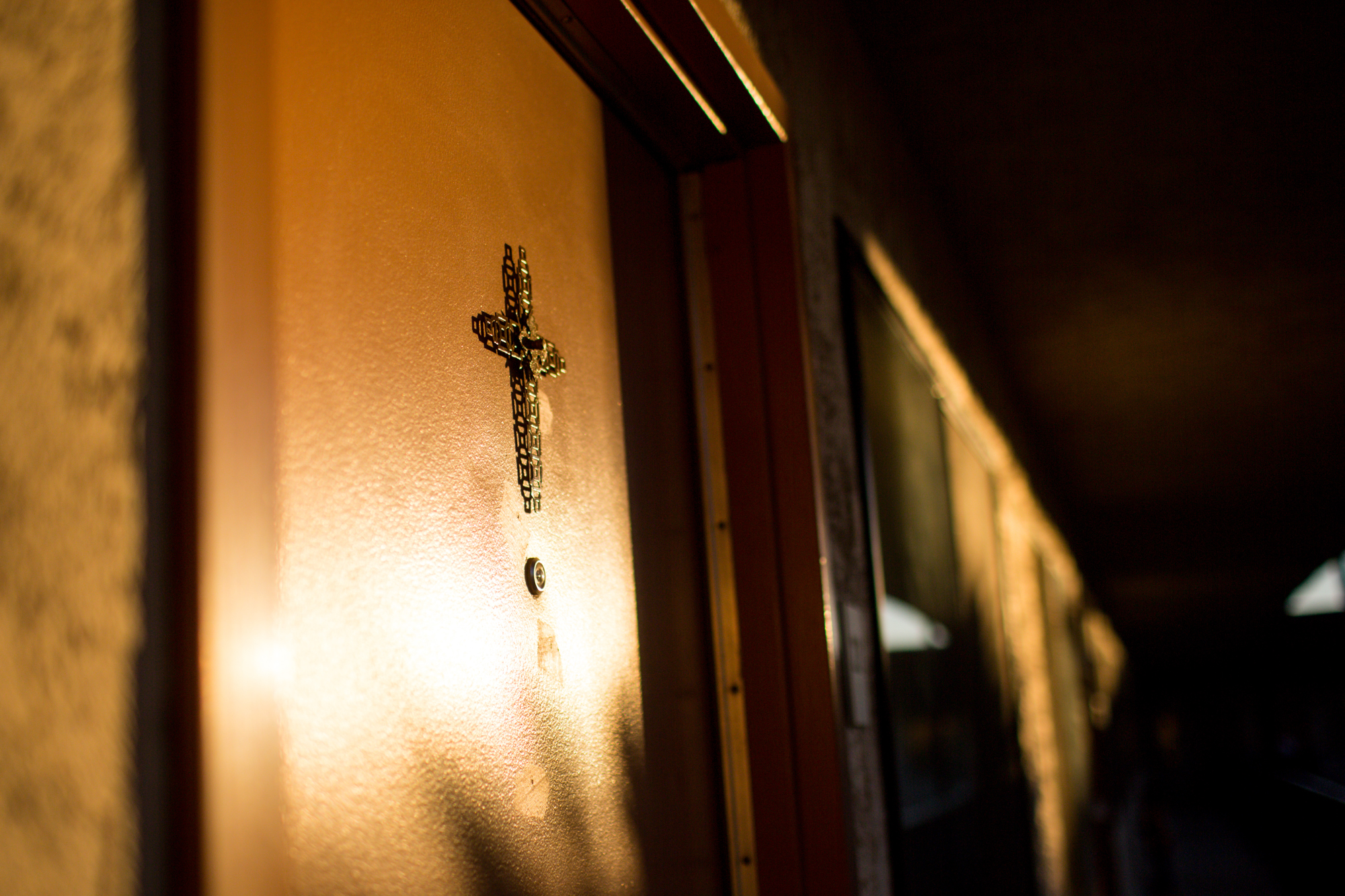
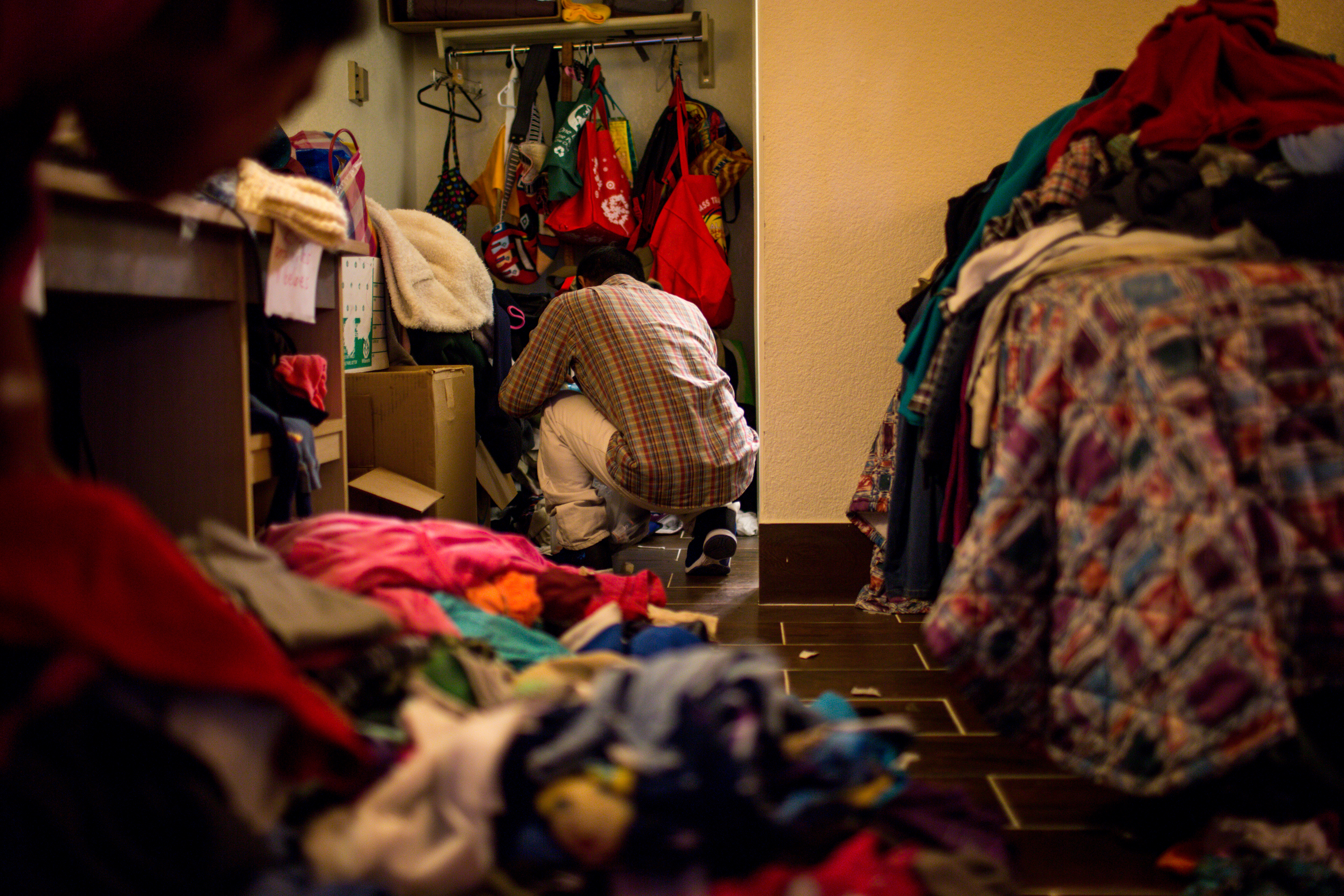
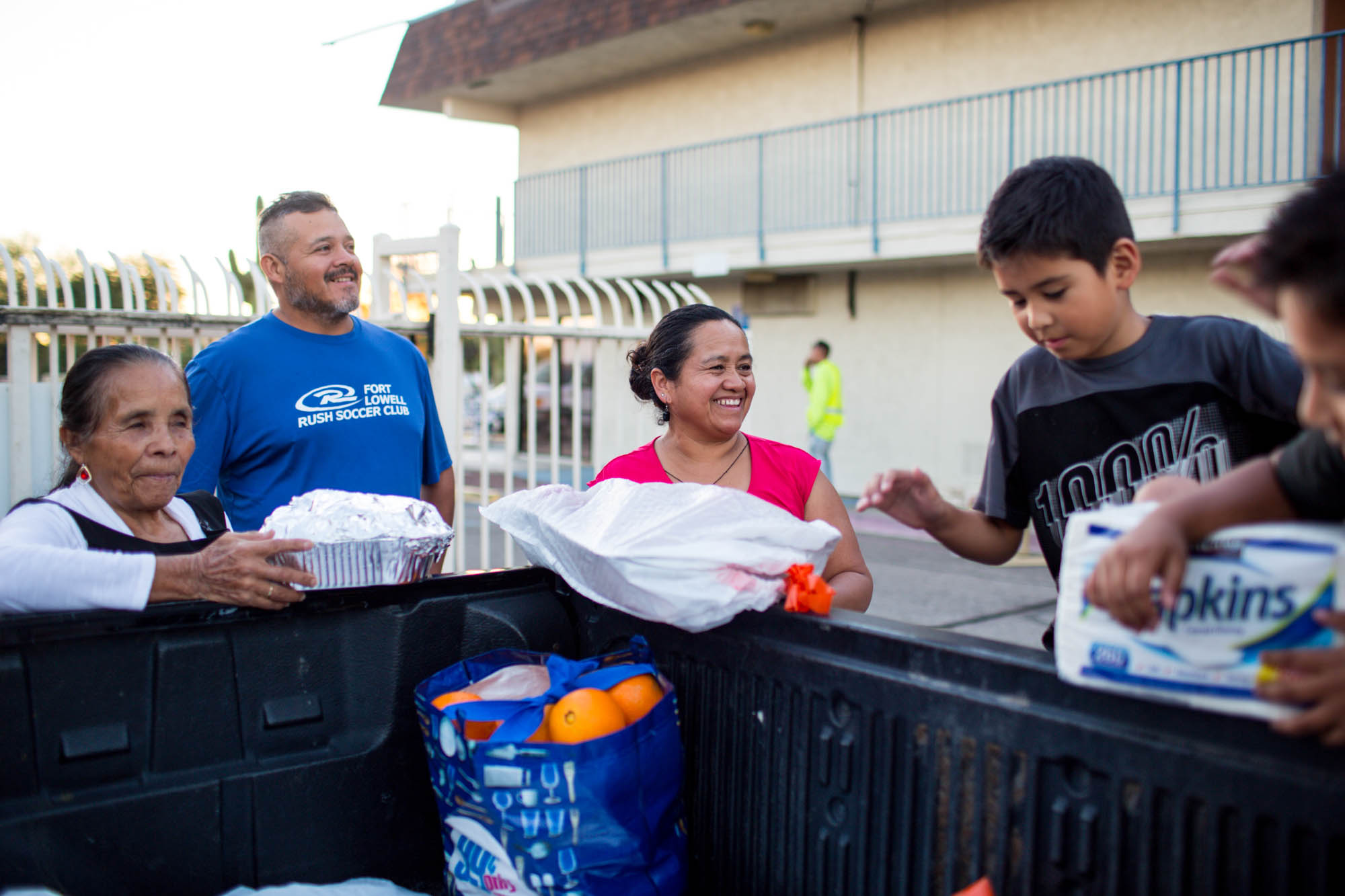
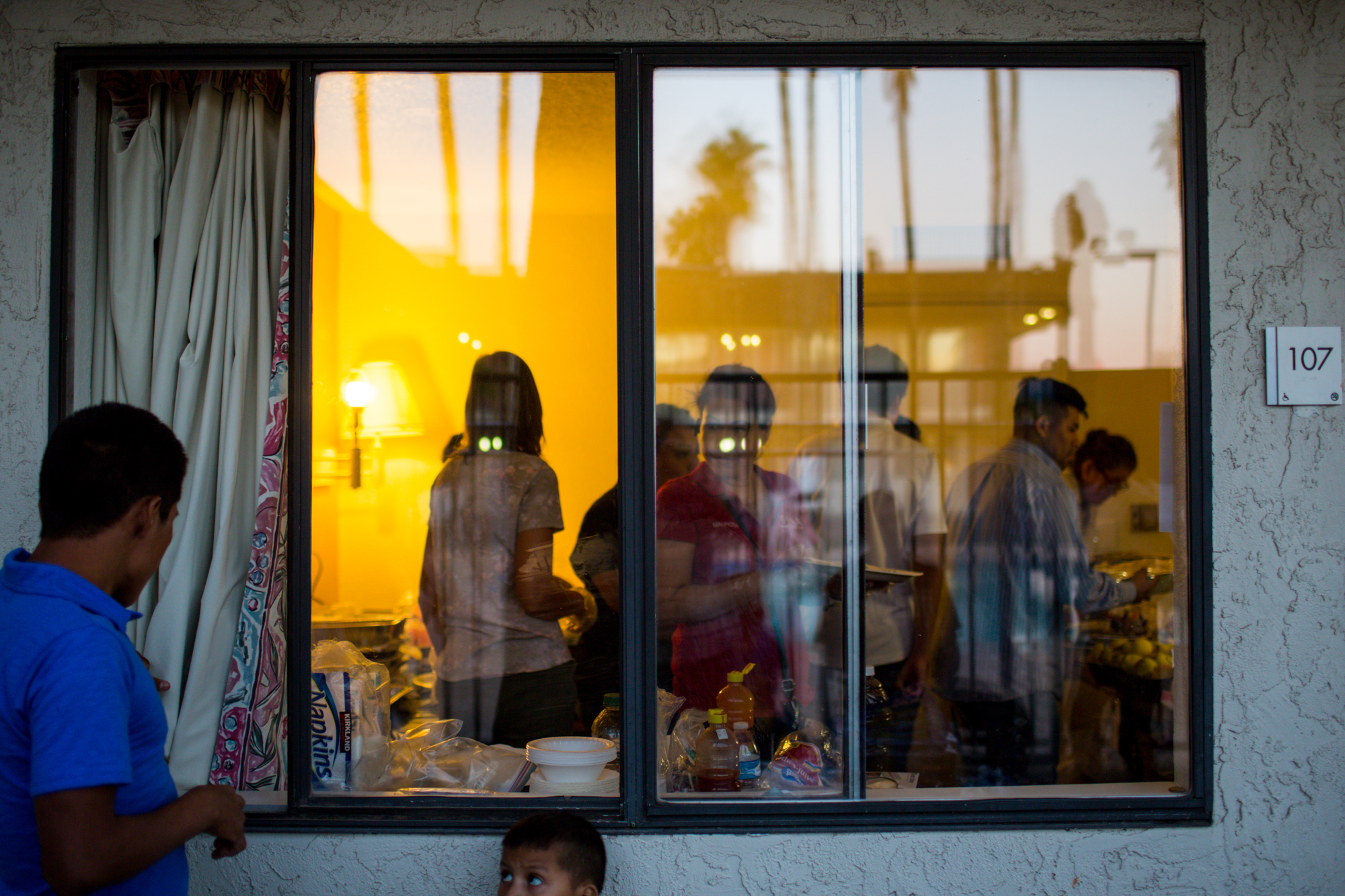
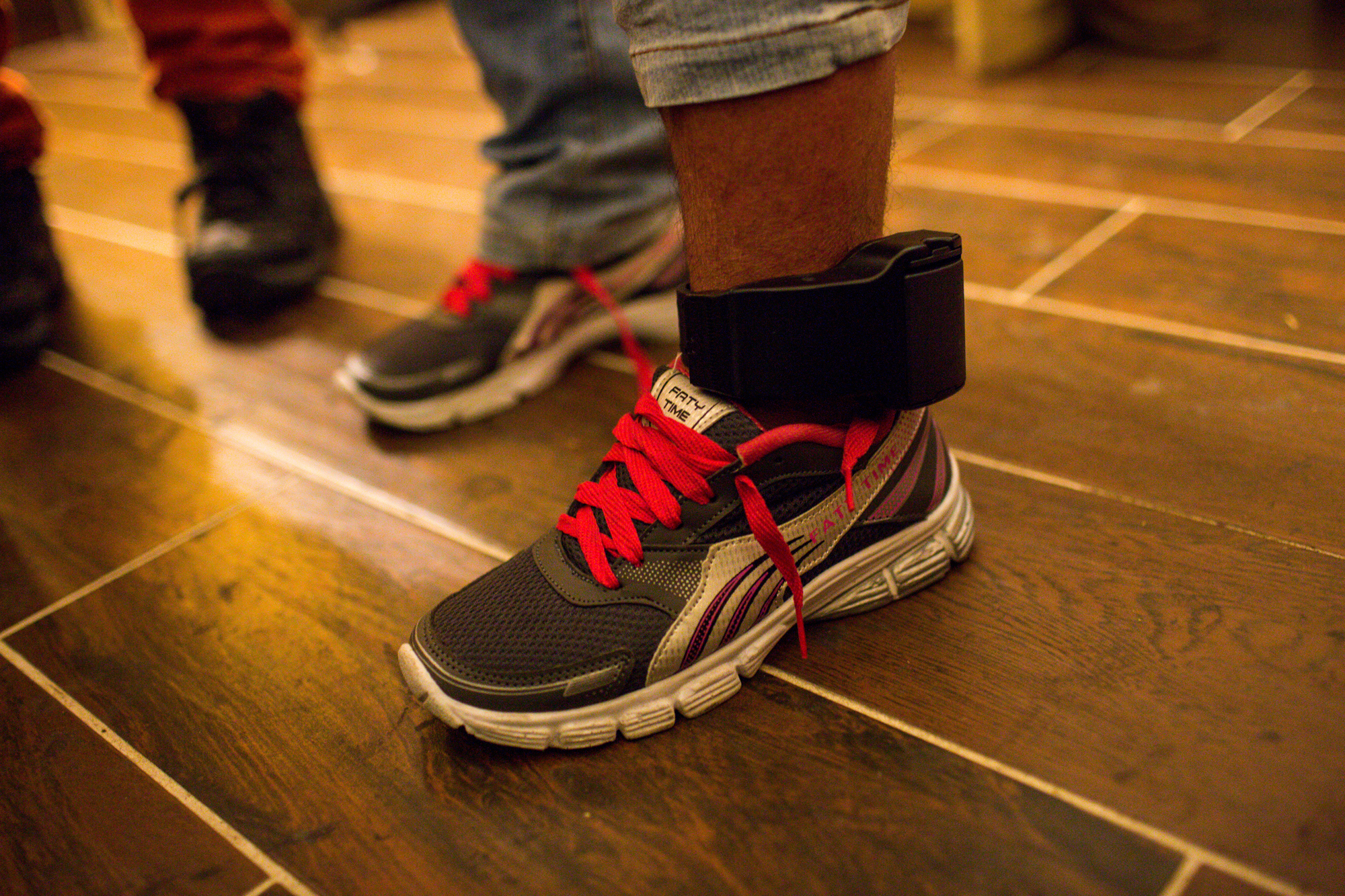
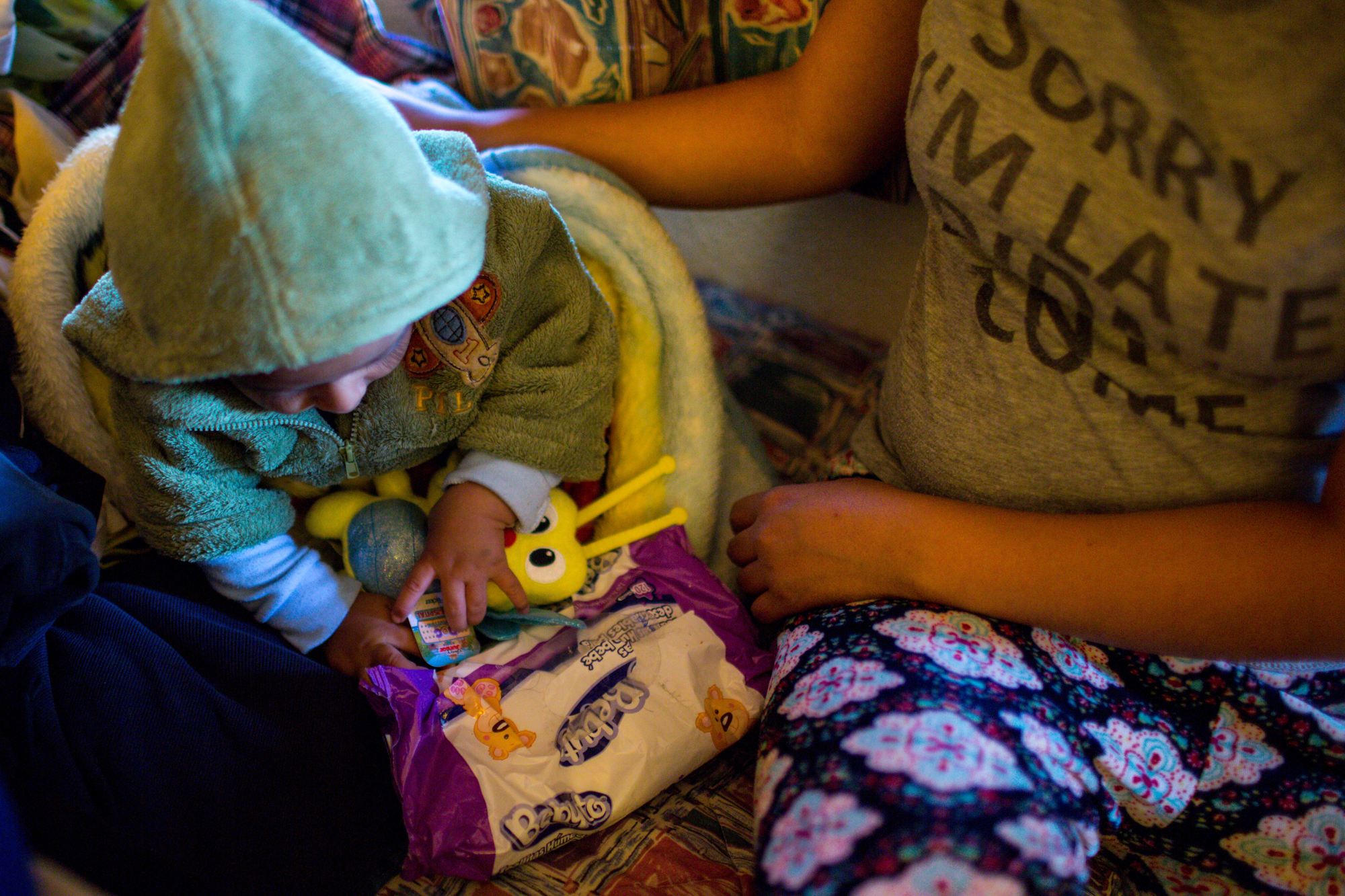
Leave a Comment
[fbcomments]